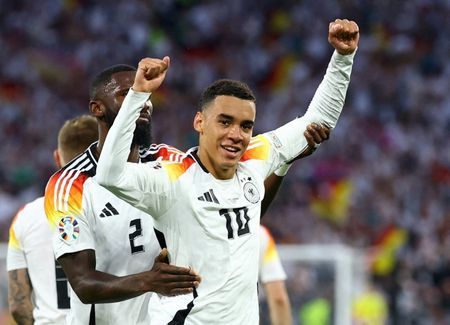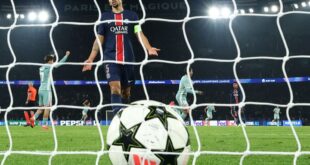MUNICH, Germany (Reuters) – Germany’s young attackers sent a clear message that they are ready to lead the team into a new era, with 21-year-olds Florian Wirtz and Jamal Musiala putting on a sparkling display in their country’s opening 5-1 Euro 2024 win over Scotland on Friday.
The two wingers scored the opening goals in the Group A victory, while Kai Havertz, 25, converted a penalty and substitutes Niclas Fuellkrug and Emre Can scored in the second half against the reeling 10-man Scots.
But it was Wirtz and Musiala who drew the eyes of the expectant, yet anxious, home fans who had been chastened by Germany’s underperformance in the past decade – with the team going out of successive World Cups (2018, 2022) in the group stage and losing in the last 16 at Euro 2020.
Wirtz underlined his status as one of European football’s most exciting young talents with his goal, having already tested goalkeeper Angus Gunn in the opening minutes of the match.
His 10th-minute strike was a perfect example of his play this past year, with 11 goals and 12 assists for Bundesliga champions Bayer Leverkusen, ghosting in at the edge of the area to power the ball home, despite Gunn getting a hand on it.
It meant Wirtz became the youngest scorer for Germany at a Euros at 21 years and 42 days old, beating the previous record of Havertz who was 22 when he scored at Euro 2020.
Musiala, who grew up in England and played for their youth team but then opted to represent the nation of his birth, got a much cleaner strike when he smashed the ball high into the net nine minutes later having been teed up by Havertz in the box.
The forward, given the prestigious No. 10 shirt by Julian Nagelsmann, is only 67 days older than Wirtz and ran Scotland’s defence ragged with his deft technique while travelling with the ball, which has earned him the nickname “Bambi”.
While stalwarts like keeper Manuel Neuer, 38, and captain Ilkay Gundogan, 33, are still in the starting lineup, there is a sense of a passing of the torch, particularly in the attacking area of the pitch where Germany have struggled in recent years.
They are ably helped by the precision passing of 34-year-old Toni Kroos. The midfield maestro, who will retire from playing after the tournament, had a 99% passing accuracy rate during his 80 minutes – though tougher opponents will come.
He has won a glut of titles at club level with Bayern Munich and Real Madrid and was part of the Germany team that won the World Cup in 2014. But helping to win their first Euro title in almost 30 years at home would be a perfect climax to his career.
Nagelsmann, who made history on Friday as the youngest coach at a Euros aged 36 years and 327 days, eclipsing Slovenia’s Srecko Katanec, could have found the perfect balance between youth and experience to take his country to glory.
(Reporting by Christian Radnedge; Editing by Ken Ferris)
 BeritaKini.biz Berita Viral Terkini di Malaysia
BeritaKini.biz Berita Viral Terkini di Malaysia





